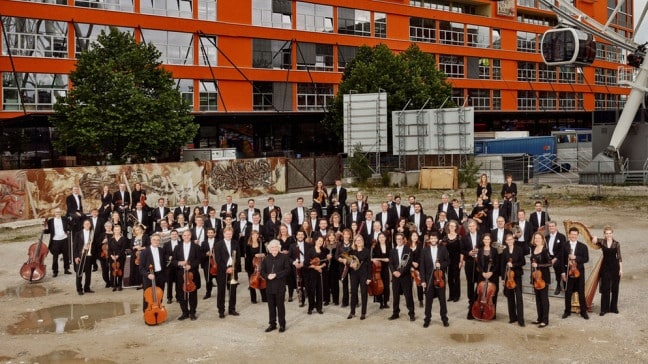Maestro moves: Brussels appoints a new chief
mainPress release:

The Brussels Philharmonic has appointed Stéphane Denève as its next Chief Conductor and inaugural Director of the new Centre for Future Orchestral Repertoire (Cffor). The French conductor, who succeeds Michel Tabachnik in September 2015, was chosen for the post to help realise the innovative and pioneering Orchestra’s ambitious artistic strategy. The Centre for Future Orchestral Repertoire, meanwhile, is set to create an extensive online database, which will be a global platform for the Brussels Philharmonic’s ground-breaking enterprise to promote the finest 21st-century orchestral compositions to repertoire status. Cffor will gather key information about symphonic works created since 2000 and begin the great debate about those compositions most likely to endure for decades to come.
In the Beginning
Stéphane Denève made his debut with the Brussels Philharmonic in November 2013, performing works by Gershwin, Roussel and Shostakovich. “The experience exceeded all my expectations: the talent, the dedication, the good mood and open-minded spirit offered by the musicians during our rehearsals were totally inspiring. The passion, generosity and enthusiasm shared during our first concert together made a strong impression on me. The warm audiences, and also the modernity, boldness and flexibility of the whole institution and its management, helped me to foresee an extremely fulfilling and exciting collaboration. And this, in turn, allowed me to imagine an ambitious and innovative artistic project.”
Denève’s subsequent discussions with the Orchestra’s General Manager, Gunther Broucke, prepared the ground for Cffor’s creation and for his appointment as Chief Conductor. “I was so excited by Gunther’s creative mind and positive outlook when we first met that I gladly accepted his invitation to work with the Orchestra last year,” the conductor recalls.
A Meeting of Minds
Denève found a close ally in Gunther Broucke. Both men expressed concerns about today’s orchestral repertoire, its increasing dependence on a narrow stream of works from the past, and the urgent need to introduce audiences worldwide to the present century’s best symphonic compositions. The idea for Cffor arose during their early meetings and influenced Denève’s decision to join the Brussels Philharmonic’s artistic adventure. “I believe the stars are in perfect alignment for this project,” he comments. “The Brussels Philharmonic is a fine orchestra with an excellent manager. There has been a ‘buzz’ in the news about the orchestra’s work in recent years, thanks not least to its innovative programming and successful touring with Michel Tabachnik and because of its soundtrack recordings for movies like the Academy Award winner The Artist.” He believes that Brussels, with its strong cultural life and place at the heart of European affairs, offers an ideal base for the revitalisation of orchestral programming…
and so on…





“Cffor will gather key information about symphonic works created since 2000 and begin the great debate about those compositions most likely to endure for decades to come.”
This highly idealistic and laudable ‘mission statement’ suggests the presence of geniusses, who will be able to immediately assess the artistic qualities of new works, which otherwise has shown to be a slow filtering process that – as demonstrated by history – normally takes decades of trial and error to arrive at some quasi-objective ‘canon’ of repertoire works. Who could foresee, in the sixties and seventies, the inclusion of Shostakovich and Prokofiev into the central repertoire? And predict the utter failure of postwar atonal contemporary music to be absorbed into the regular orchestral programming? When, in the text, is referred to a film music tour, the intention to address “….the urgent need to introduce audiences worldwide to the present century’s best symphonic compositions” raises some really serious questions.
My archive of concert programmes shows that Prokofiev and Shostakovich were very much part of the ‘central repertoire’ even in the 60s and 70s, at least here in the UK. What would have required foresight in the 60s and 70s would have been to predict the eventual inclusion of Mr Borstlap’s compositions in this repertoire.
This conductor deserves a better orchestra!
The UK had, in the 2nd half of the last century, a rather different music life since modernism never got such ideological strength as it got on the continent, in spite of the attempts of Goehr, Birtwistle, MaxwellDavies etc. The UK has always been a much more traditional country and did not suffer from a postwar cultural hangover to the same extent as the continent which had been under the nazi boot. While traditionalist Benjamin Britten was propelled to England’s Great Composer, his music was not welcome in Germany, France, Netherlands. In the fifties and early sixties, in Holland Britten was regularly invited to conduct his own works, demonstrating a beginning of popular acceptance, but after the local ‘modernist revolution’ he was considered ‘old hat’ and no longer played. Britten and Shostakovich were kind of friends, still clinging to tradition, in different ways and for different reasons.
I spoke with an Austrian conductor some 10 years ago who complained that in Vienna, Bartok and Prokofiev were ‘still’ considered ‘unacceptable’, too modern. In Munich, audiences were (are?) notoriously resistant to Russian music, incl. Stravinsky, and more so to modernism, which is a matter of cultural identity and taste rather than conservatism. On the continent then, traditional programming in the orchestral field withdrew into a bunker, considering anything different – modernism and also Shos and Prok – as ‘alien’. The ideological rages at the time discouraged ANY deviation from time-tested programming. Only recently that situation has begun to be less stringent.
As for the personal slur: it is interesting to see how people want to become personal as soon as arguments run out or the mind bumps into its own limitations of knowledge.